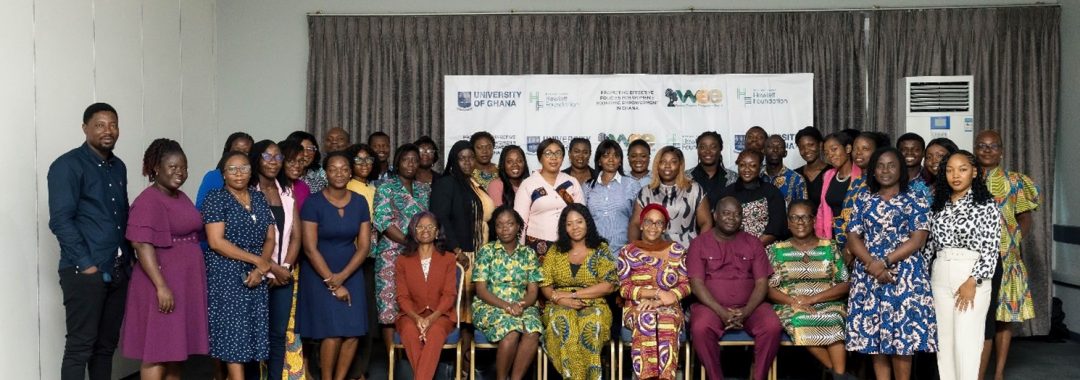The ‘Promoting Effective Policies for Women’s Economic Empowerment’ (WEE-Ghana) project has convened key voices from government, civil society organisations (CSOs), academia, the private sector, and the informal economy to advance dialogue on gender-responsive taxation as a catalyst for women’s economic empowerment.
Held on April 24, 2025, at the Fiesta Royale Hotel in Accra, the deliberations focused on how taxation policies could better support women’s economic inclusion and address systemic barriers facing women across all productive sectors of the economy. Participants explored critical intersections between tax systems, social protection, and gender equity, reinforcing the urgent need for reforms that authentically reflect the realities of women’s economic participation
In her opening remarks, a co-principal investigator for macro-economic policies, under the project, Professor Abena Oduro, underscored the importance of creating fiscal policies that did not unintentionally disadvantage women but instead promoted entrepreneurship, job creation, and resilience. She noted, “Empowering women economically requires that we look closely at how our tax structures either enable or inhibit growth opportunities for women.”
Further drawing from evidence presented during the sessions, Professor Oduro, expounded on two critical issues: how taxes affected women differently, and what a good, gender-responsive tax system should look like. Tax systems, she highlighted, could not afford to assume neutrality given that, “Taxes affect women differently because the labour market, consumption expenditure, and ownership of assets are gendered, and women disproportionately bear the burden of care.— A gender-responsive tax system, noted the co-principal investigator, had to recognise unpaid care work, reduce burdens from consumption taxes, and support women’s productive ventures, through targeted incentives and better public services.
A researcher on the WEE-Ghana project, Dr. Gloria Afful-Mensah, shared some findings from a year-long analysis of tax policies, revealing how Ghana’s tax system often overlooked gender considerations. Although taxes such as the Personal Income Tax (PIT) and Corporate Income Tax (CIT) were not explicitly gender-biased, there were elements of less obvious (implicit) biases. For instance, while the CIT varied based on the nature, location, and specific activity(ies) of a business, the incentive structure lacked gender sensitivity. As a result, businesses might be less motivated to employ women of reproductive age, anticipating potential interruptions due to their social reproduction responsibilities.
Similarly, the Value Added Tax (VAT) and the Electronic Transfer Levy (E-Levy), while framed as neutral, were found to have gendered effects, with women bearing heavier financial burdens due to gender differences in consumption patterns, economic activity, and care responsibilities. A vivid example of this emerged in the findings of Anyidoho et al. (2023), which revealed that among women in the lowest income quintile, E-Levy payments could consume up to 17% of their monthly earnings, compared to about 14% among men in the same income group — a stark reminder that tax policy impacts were far from gender-neutral. Dr. Afful-Mensah further noted that the removal of the E-levy could greatly benefit women, improve their competitiveness and potentially boost their sales, profitability and overall economic empowerment.
Later in the convening, participants broke into three smaller working groups to critically engage with Ghana’s 2025 Budget Statement. One group reviewed selected tax measures — including the repeal of the Betting Tax, introduction of the Emission Levy, and VAT on motor insurance — to assess their gendered impacts. Another group explored barriers to tax compliance from a gender perspective, examining the challenges women face both as taxpayers and within tax administration. The third group proposed ways to make planned VAT reforms more gender-sensitive, suggesting how fiscal policy design could better address women’s economic realities.
During the group presentations, participants raised critical concerns about the application of VAT on basic food commodities, emphasising how such taxes disproportionately affected low-income households, particularly those headed by women. They highlighted the urgent need for greater tax incentives and targeted reliefs for women-led micro, small, and medium enterprises (MSMEs), arguing that current fiscal measures often overlooked the realities of women entrepreneurs operating within the informal sector.
A participant from the Executive Women Network, a nonprofit comprising senior executives and women entrepreneurs, noted, “Without deliberate exemptions or rebates targeted at women entrepreneurs, we risk widening the very inequalities we say we want to close.”
As the event closed, there was a clear consensus that sustainable economic empowerment for women hinged not only on access to opportunities but also on deliberate policy shifts — and that collaboration between stakeholders would be essential to driving these changes forward.

